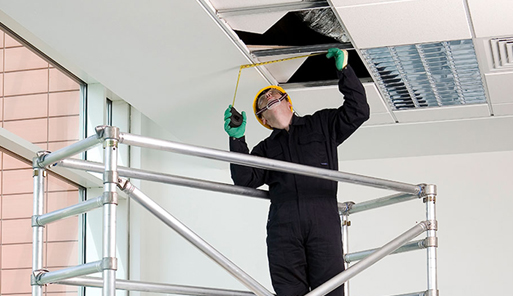PASMA Combined Standard and Low Level Access Training
Course Objective:
To instruct the candidate to safely, assemble, dismantle and relocate low level access units and standard mobile access towers without risk of personal injury to the delegate or others.
Course Content:
- Legislation
- Regulations and guidance regarding working at height with low level units and mobile access towers
- PASMA code of practice
- Publicly available specification
- Assembling
- Altering and dismantling towers incorporating current best practice for fall protection
- Inspection of both low level and completed standard mobile access towers
- Completion of tower inspection records
- Hazards affecting the use of mobile access towers and how to avoid
Course Method:
Instruction in both theory and practical sessions, with assessments. A course content and notes booklet and a current Code of Practice booklet will be issued to all delegates who attend the course.
Personal Protective Equipment Needed:
- Hard hat
- High visibility jacket
- Steel capped work boots
- Safety gloves
Certification:
A PASMA certification and photo card.
Course Duration:
One day
Instructor to Delegate Ratio:
One instructor to eight delegates
Literacy, Fitness and Health*:
Since the safe use of mobile access towers requires that delegates consult safety notices and read and thoroughly understand the manufacturers’ instruction manual, literacy and language comprehension are important requirements for any tower user.
Similarly since the assembly and use of mobile access towers can be physically demanding, users should be physically fit and in good health and should, generally not have problems with eyesight or hearing, heart disease, high blood pressure, epilepsy, fear of heights, vertigo, giddiness, difficulty with balance, impaired lung function, alcohol or drug dependence of psychiatric illness.
If delegates have any problems with literacy or language comprehension or have any doubts about their fitness to use mobile access towers they must bring them to the attention of their employer.
This need not preclude them from using mobile access towers provided their employer conducts an assessment and is able to put into place adequate measures to take account of any difficulties they may have.
*Extract from the PASMA code of practice
PASMA Combined Standard and Low Level Access Training
Course Objective:
To instruct the candidate to safely, assemble, dismantle and relocate low level access units and standard mobile access towers without risk of personal injury to the delegate or others.
Course Content:
- Legislation
- Regulations and guidance regarding working at height with low level units and mobile access towers
- PASMA code of practice
- Publicly available specification
- Assembling
- Altering and dismantling towers incorporating current best practice for fall protection
- Inspection of both low level and completed standard mobile access towers
- Completion of tower inspection records
- Hazards affecting the use of mobile access towers and how to avoid
Course Method:
Instruction in both theory and practical sessions, with assessments. A course content and notes booklet and a current Code of Practice booklet will be issued to all delegates who attend the course.
Personal Protective Equipment Needed:
- Hard hat
- High visibility jacket
- Steel capped work boots
- Safety gloves
Certification:
A PASMA certification and photo card.
Course Duration:
One day
Instructor to Delegate Ratio:
One instructor to eight delegates
Literacy, Fitness and Health*:
Since the safe use of mobile access towers requires that delegates consult safety notices and read and thoroughly understand the manufacturers’ instruction manual, literacy and language comprehension are important requirements for any tower user.
Similarly since the assembly and use of mobile access towers can be physically demanding, users should be physically fit and in good health and should, generally not have problems with eyesight or hearing, heart disease, high blood pressure, epilepsy, fear of heights, vertigo, giddiness, difficulty with balance, impaired lung function, alcohol or drug dependence of psychiatric illness.
If delegates have any problems with literacy or language comprehension or have any doubts about their fitness to use mobile access towers they must bring them to the attention of their employer.
This need not preclude them from using mobile access towers provided their employer conducts an assessment and is able to put into place adequate measures to take account of any difficulties they may have.
*Extract from the PASMA code of practice



